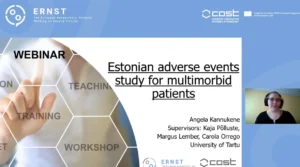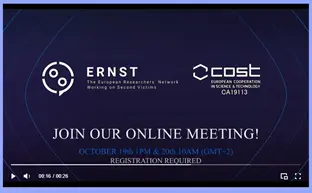Sharing knowledge and best practices concerning adverse event’s (AE) effects on healthcare professionals is key to better understand the factors around this “second victim phenomenon” in Europe. Undertaking such research takes an entirely new dimension when performed in the context of the COVID-19 pandemic and considering the significant impact the current environment has on the healthcare system in general. This is the case of COST Action ERNST that was kicked-off in September 2020, with the initial purpose of establishing a more in-depth comprehension of the complexities of these issues requiring a multidisciplinary approach. The Action has put together therefore a network of cross-national professionals across the world to implement joint efforts to support second victims, and to introduce an open dialogue and discussion among stakeholders about the consequences of the second victim phenomenon.
ERNST’s approach becomes even more meaningful when we consider the healthcare workforce as the second victim of SARS-CoV-2. The Action has undertaken a number of initiatives dedicated to gaining a better grasp on how to reinforce resilience of the healthcare workforce during the pandemic.
‘In this healthcare crisis caused by the new coronavirus, we have learned that maintaining an adequate healthcare workforce is not just a matter of the number of professionals. They must have the means and support to cope with situations of high stress, demand, and uncertainty.’ says the Chair of COST Action, Prof Joaquin Mira Solves.
COST Action ERNST is a member of the Network of COST Actions against COVID-19 and has also conducted studies and organised events specifically focused on sharing knowledge on caregivers’ situation in the context of COVID-19 and SARS-CoV-2.
Providing support to healthcare professionals: what interventions at national level?
In this period, ERNST has carried out an analysis of the approaches and interventions among ERNST members to study the phenomenon of second victims and mitigate its impact. A total of 70 ERNST members answered (85,4% response rate) from European countries, and a neighbor country (Azerbaijan). The results of this survey describe the studies on patient safety and summarize the approaches initiated to address the second victim phenomenon in those countries.
ERNST has also conducted a study on how healthcare authorities have worked at the national level to offer emotional support to alleviate the overload that the care of COVID-19 patients has entailed.
Fifty-three professionals from 34 countries involved in this COST Action contributed data to this study. The outcome highlighted that only six of the countries (19.3%) have reported a lack of interventions at national level. For the rest, it was mainly the 24-hours hotline service for psychological first aid has been the most frequent intervention. Tools for self-rescue using apps or websites have been extensively used as never before. Among other common interventions, the study highlights for example: regular pandemic updates, listening to professionals’ needs, providing rest and time off for workers ‘recovery, assuring sufficient supplies of adequate protective equipment, supporting caregivers with alternative accommodation to reduce the fear to infect families. The Action stressed that both developed and developing countries have launched similar initiatives.

Caring for caregivers: lessons learned from the COVID-19 pandemic
Last March 2021, on the 16, 17 and 18, the network organised an International Forum: ‘Caring for Caregivers: Lessons Learned from the COVID-19 Pandemic’. Held as an online event with more than 1400 registrations, the Summit targeted health professionals, managers, and directors of health institutions from Latin American countries. Sessions were organised with researchers, experts from various disciplines including stakeholders and international speakers.
The Forum presented the different countries’ work approaches in the middle of the pandemic and examples of successful interventions to support second victims.
This international conference was organised as a space for the exchange of experiences, research results, proposals, and ideas to contribute to the early recovery of health systems, and their professionals, after the impact caused by SARS-CoV-2.
Next ERNST International Forum on 19, 20 October 2021

Following the success of the first International Forum, COST Action ERNST announces its second event to be held soon on 19 and 20 October, this time focusing on Building a European Network for improving the resilience of the healthcare professional in stressful situations.
It will be organised online with conferences, experiences, and round table discussions on how to design intervention programs and revision of the state of art. Experiences on how health professionals have been supported during the COVID-19 pandemic will be shared and a table of young researchers will present their own projects.
All information about this event can be found on our website here.
“We continue to set ourselves new challenges and new spaces for debate and exchange of ideas and experiences, and we are reflecting on how to translate our commitment to patient safety into practice, involving healthcare policymakers and listening to the voice of patients through various channels.”
Coming from the necessity to focus on healthcare professionals specifically as second victims of AEs’ circumstances, this COST Action’s body of work has been timely developed. It helps tapping into an early source of experiences and information at times where the healthcare system and caregivers have been more than ever in need of cares themselves.
More information:
COST Action ERNST here
Register for next ERNST International Forum on 19, 20 October 2021 here
Read our last news about this Action in February 2021here
Recordings from 17,18,19 March 2021 – ERNST International Forum- in Spanish language, can be viewed here
